What is a Criminal Background Check in Florida?
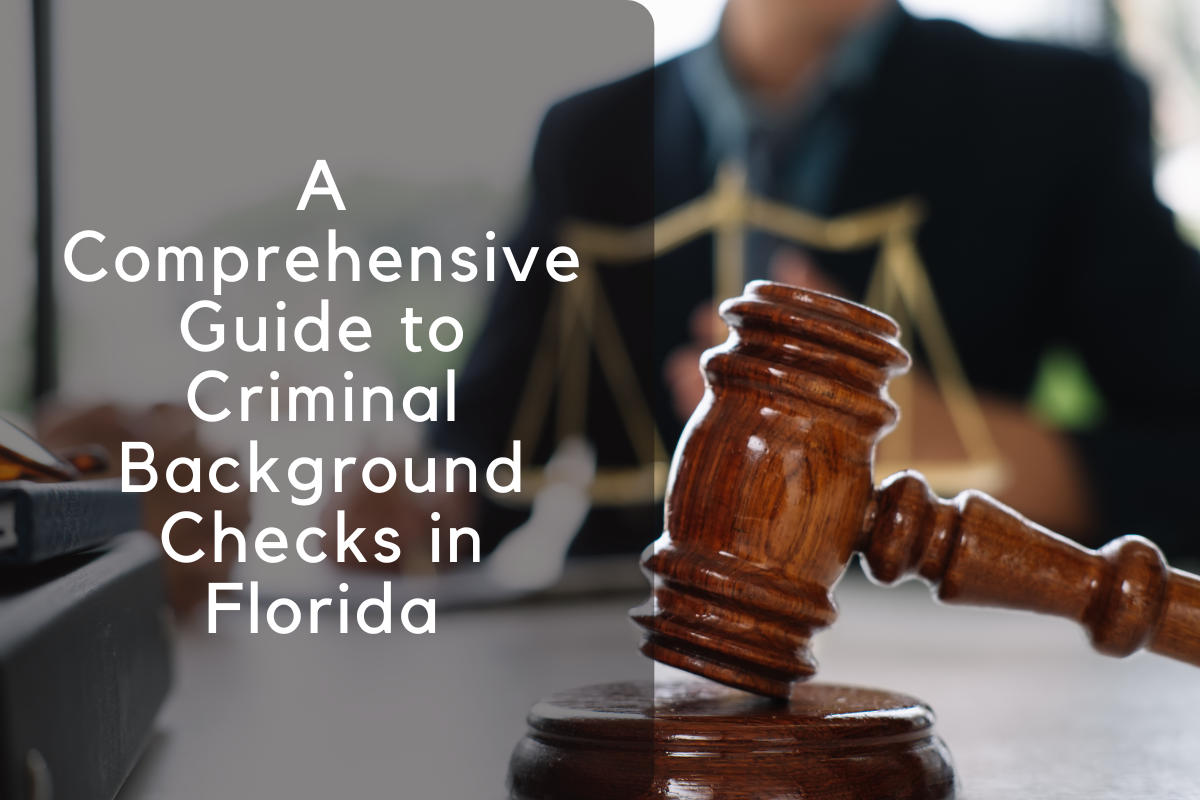
Defining a Criminal Background Check in Florida
A criminal background check is an investigation that identifies whether an individual has a history of criminal activity. In Florida, this process involves checking various sources to uncover any past arrests, convictions, or criminal behavior tied to an individual. The check is typically conducted by government agencies, employers, landlords, or other entities to assess the background of a person for reasons such as employment, housing, or legal proceedings.
Criminal background checks in Florida are commonly used to ensure that a person has a clean criminal record before they are hired for a job, allowed to rent a property, or given a position of responsibility. These checks can help identify individuals who may pose a risk to others due to prior criminal activities.
Types of Criminal Records in Florida
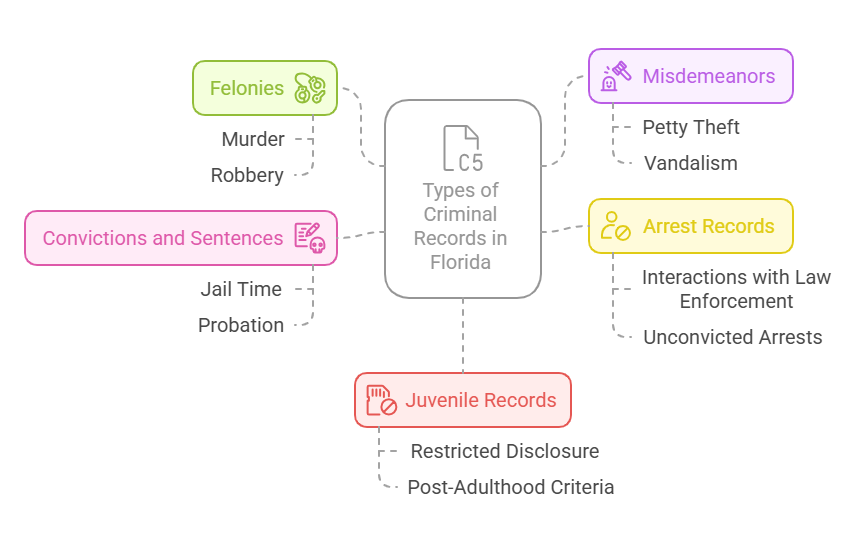
In Florida, a criminal background check may uncover various types of records, depending on the scope of the search and the specific information being investigated. The primary types of criminal records that are checked include:
1. Felonies
Felony records refer to serious criminal offenses that typically carry a sentence of more than one year in prison. Examples of felonies include murder, rape, robbery, and drug trafficking. These records are public and can be accessed through official government databases, such as the Florida Department of Law Enforcement (FDLE).
2. Misdemeanors
Misdemeanors are less severe crimes compared to felonies and are generally punishable by fines or imprisonment for less than one year. Examples include petty theft, vandalism, and public intoxication. Misdemeanor records are also accessible and may be part of the criminal background check.
3. Arrest Records
Arrest records provide information about an individual’s interactions with law enforcement and may indicate whether a person has been arrested but not necessarily convicted. While an arrest does not mean guilt, it’s important for employers or landlords to be aware of prior arrests when making decisions.
4. Convictions and Sentences
Criminal background checks also reveal any convictions a person may have received in a court of law. These include guilty verdicts for criminal offenses and the penalties handed down, such as jail time, probation, or community service. Convictions are important factors when assessing an individual’s suitability for a particular role or opportunity.
5. Juvenile Records
In some cases, a person’s juvenile criminal history may also be reviewed, although the disclosure of juvenile records is often restricted. Employers and others may not have access to juvenile records unless certain criteria are met, depending on the severity of the offense and whether it occurred after the individual reached adulthood.
Why Request a Criminal Background Check in Florida?
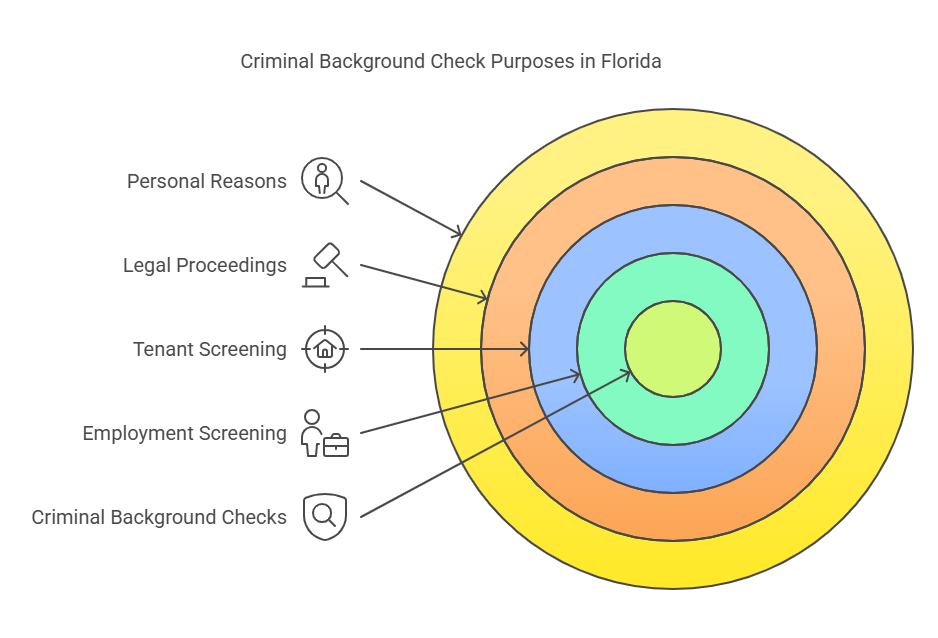
Criminal background checks are requested for a variety of reasons in Florida. The most common reasons include:
1. Employment Screening
Employers frequently conduct criminal background checks to ensure that potential employees do not have a criminal history that could pose a risk to the business or its staff. Background checks are a key component of the hiring process in industries such as healthcare, finance, education, and law enforcement.
For employers, criminal background checks help reduce the likelihood of hiring individuals with histories of violence, theft, fraud, or other behaviors that could undermine the trust of the organization and its clients.
2. Tenant Screening
Landlords in Florida may conduct criminal background checks on prospective tenants to ensure that they are renting to individuals who will not cause disruptions, harm, or legal problems in the rental community. A clean background check can be an important factor in leasing agreements, helping to prevent property damage, criminal activity, or tenant disputes.
3. Legal or Court Proceedings
Attorneys, courts, and other legal professionals often request criminal background checks as part of ongoing legal proceedings. A criminal record may impact a person’s eligibility for certain programs, like adoption or gun ownership, and may also influence custody battles, probation, or parole decisions.
4. Personal Reasons
Individuals may choose to perform a criminal background check on themselves as part of a personal inquiry. For example, they might want to verify the accuracy of their records, clear up discrepancies, or simply ensure that their background is clean when applying for jobs, housing, or other opportunities.
5. Gun Purchases
In Florida, as in many other states, individuals looking to purchase a firearm must undergo a background check to ensure they are legally permitted to own one. A criminal background check will be part of the process to determine whether a person has a criminal record that would disqualify them from owning a weapon.
How to Conduct a Criminal Background Check in Florida
Steps to Conduct a Criminal Background Check in Florida
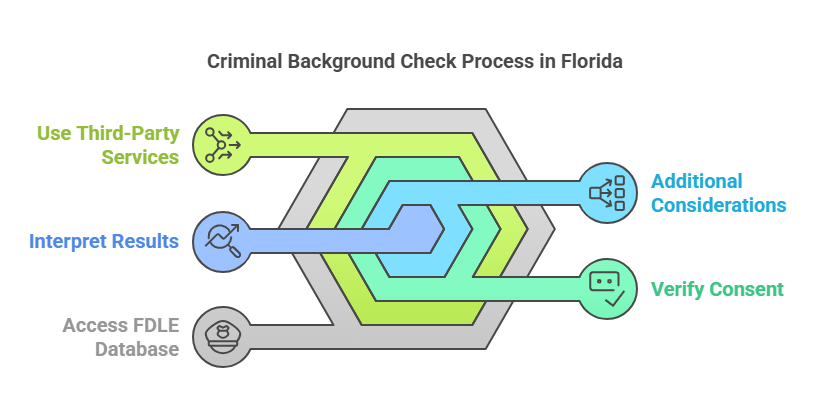
Conducting a criminal background check in Florida involves several key steps. Depending on whether you’re an individual or an employer, the process can vary slightly, but it generally follows the same general framework. Here’s how to go about it:
1. Determine the Scope of the Background Check
Before starting the background check, it’s important to understand exactly what type of information you need. For example, are you interested in a complete history (felonies, misdemeanors, arrests) or just a specific type of record (such as convictions)? Defining the scope helps narrow down the process.
- Employer Checks: Often look for felonies, misdemeanors, and convictions that could affect workplace safety or integrity.
- Tenant Checks: Typically focused on arrest records, criminal history, and any violent or disruptive behaviors.
- Self-Checks: Individuals may want a full review of all criminal records to ensure there are no surprises when applying for jobs or housing.
2. Access Florida Department of Law Enforcement (FDLE) Database
The Florida Department of Law Enforcement (FDLE) is the state’s primary agency responsible for managing criminal background records. FDLE provides access to criminal history information for both individuals and organizations.
To perform a criminal background check, you can:
- Visit the FDLE Website: FDLE offers an online service for requesting criminal history information, where you can get your own record or request a background check for someone else (with their consent).
- Submit a Fingerprint-based Background Check: For a more comprehensive background check, you may be asked to provide fingerprints, especially if you need to get a thorough check for employment or legal purposes. This is known as a Live Scan fingerprinting check.
- Request by Mail: For those who prefer traditional methods, criminal background checks can also be requested through the FDLE by mail. This process may take longer and requires more paperwork.
3. Use Third-Party Services for Background Checks
While the FDLE is the official resource for criminal records in Florida, many third-party services also offer background check services. These services typically aggregate data from multiple sources, including court records, arrest databases, and more. They may be faster and more convenient than going through the FDLE, especially for those who need results quickly.
If you’re conducting a background check for an employee or tenant, using a service like rapid hire solutions can help streamline the process. They provide professional background screening services and can assist you with checking criminal history records, as well as other necessary employment screenings.
These services often offer comprehensive background checks that include:
- National databases to check out-of-state records
- Social security number trace to ensure that the individual is who they claim to be
- Employment history verification
Using a third-party service can save time and provide a more complete picture of an individual’s background.
4. Verify Consent and Compliance with Florida Laws
Florida, like many other states, has strict regulations regarding privacy and consent when performing background checks. Before accessing someone’s criminal history, you must ensure that you have their written consent if you’re conducting the check for employment, housing, or any other third-party purpose.
Additionally, Florida law mandates that all background checks must be performed in compliance with the Fair Credit Reporting Act (FCRA), which sets rules for how criminal background information can be used, especially in hiring decisions.
Employers, for example, must be cautious when considering a candidate’s criminal record. They should be aware of “ban-the-box” laws, which prevent employers from asking about criminal history on job applications in certain circumstances. This is designed to help individuals with criminal backgrounds have a fair chance at employment.
5. Interpret the Results of the Background Check
Once you have obtained the results of the criminal background check, the next step is to interpret them. Understanding the different types of records and their significance is crucial, especially if you are using the background check to make important decisions like hiring or leasing a property.
- Criminal Records Review: Check whether any felonies, misdemeanors, or arrest records appear. If a conviction is found, evaluate its relevance to the position or opportunity in question.
- Timeframe of Offenses: Some states, including Florida, limit how long criminal records can affect certain decisions. For instance, certain offenses may be expunged or sealed after a number of years, which can impact whether they appear in the background check.
- Discrepancies and Errors: Sometimes, background checks may contain errors or discrepancies. If you believe the results are inaccurate, you can contact the FDLE or the service provider to request clarification or corrections.
6. Additional Considerations for Employers and Landlords
For employers and landlords, background checks are an essential part of assessing risk and suitability. However, it’s important to ensure that the process is both legal and ethical. This includes:
- Non-Discrimination: Employers must avoid discrimination based on race, gender, or other protected characteristics. Decisions should be based on the relevance of criminal history to the specific position.
- Transparency: Individuals must be informed about the background check and its purpose, and in many cases, they must be given an opportunity to explain any findings in their record.
Importance of Compliance with Florida’s Background Check Regulations
Ensuring compliance with Florida’s criminal background check regulations is vital to avoid potential legal issues. Failure to comply with the FCRA or other privacy laws could result in lawsuits or penalties. Employers, in particular, should be mindful of the legal requirements for conducting criminal background checks and make sure they are obtaining consent when needed.
Using trusted services like www.rapidhiresolutions.com ensures that you’re compliant with Florida regulations, whether you’re conducting a background check for a new hire, tenant, or other purposes. These services help navigate the complexities of legal compliance, providing a secure and professional service to all parties involved.
Legal Aspects of Criminal Background Checks in Florida
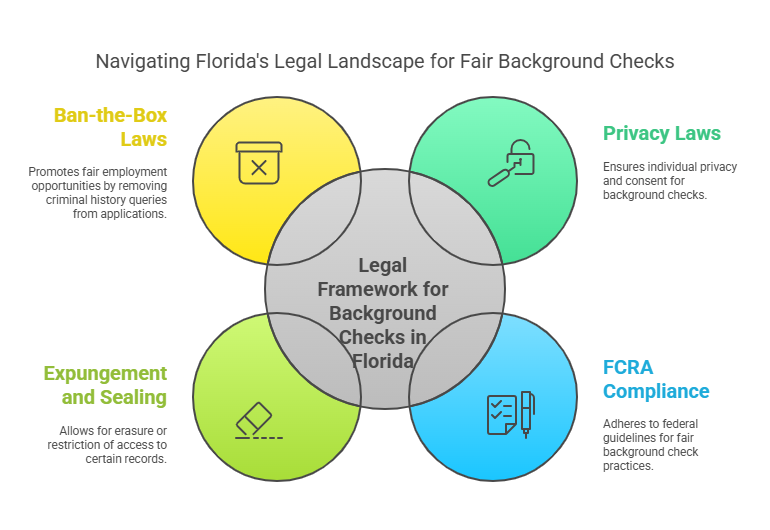
Criminal background checks in Florida are governed by several key legal considerations designed to protect individual privacy while ensuring fair practices in employment, housing, and other contexts. Understanding these laws is crucial for employers, landlords, and individuals requesting background checks.
1. Privacy Laws and Consent Requirements
In Florida, individuals have a right to privacy when it comes to their criminal history, and any background check request must comply with privacy laws. Specifically, if you’re requesting a background check for someone else (e.g., an employee or tenant), written consent is typically required. This consent gives the requester permission to access the individual’s criminal records.
- Written consent must be clear and specific, explaining the purpose of the background check.
- Florida law requires that the individual be informed of the intent to use their criminal record for decision-making purposes, whether it’s for employment, housing, or other legal matters.
2. Fair Credit Reporting Act (FCRA) Compliance
The Fair Credit Reporting Act (FCRA) is a federal law that sets guidelines for how background checks should be conducted. Employers, landlords, and other entities must comply with FCRA rules, which include:
- Disclosure: Applicants or tenants must be notified when a background check is being performed.
- Adverse Action: If a criminal record leads to a negative decision (e.g., denying employment or a rental application), the individual must be notified and provided with a copy of the background check results. They must also be given the opportunity to dispute any inaccuracies.
3. Expungement and Sealing of Criminal Records
In Florida, certain criminal records can be expunged or sealed after a specific period, making it more difficult for background checks to reveal past offenses. If someone’s record has been expunged or sealed, certain employers or organizations may not be able to access that information.
- Expunged Records: Expungement means the criminal record is erased or destroyed. Once expunged, the record is no longer available to most background checks.
- Sealed Records: Sealing means that the record is hidden from most public searches but can still be accessed by law enforcement or certain government agencies.
It’s essential for employers and others conducting background checks to understand that if an individual’s record has been sealed or expunged, they may not be legally obligated to disclose it.
4. Ban-the-Box Laws
Florida has implemented certain Ban-the-Box laws in several municipalities, which aim to give individuals with criminal records a fair chance at employment. These laws prohibit employers from asking about an applicant’s criminal history on job applications, allowing candidates to be evaluated based on their skills and qualifications before criminal history is considered.
- Ban-the-Box laws typically apply only to public employers or employers with a certain number of employees, so private employers should be sure to check if these laws apply to their specific business.
Frequently Asked Questions (FAQs)
Here are some of the most commonly asked questions related to criminal background checks in Florida:
The time it takes to complete a criminal background check in Florida depends on the type of check being conducted and the method used. An online request through the Florida Department of Law Enforcement (FDLE) may take just a few minutes, but a fingerprint-based check or mail request could take several days or even weeks.
A criminal background check in Florida may reveal felonies, misdemeanors, arrest records, convictions, and probation statuses. Certain records, such as those that have been expunged or sealed, may not appear.
Yes, you can conduct a criminal background check on yourself through the FDLE. The process involves submitting your fingerprints or requesting a name-based search. This can be useful if you want to check for any errors in your record or if you're preparing to apply for a job or rental.
Yes, a criminal background check in Florida can affect your job prospects. Employers are allowed to review criminal records when making hiring decisions, but they must follow strict guidelines, such as not discriminating based on race or other protected characteristics and complying with FCRA rules. Expunged or sealed records may not be considered during the hiring process.
If you notice an error in your criminal background check, you should contact the agency that provided the report, whether it’s the FDLE or a third-party background screening service. You may be required to submit documentation or proof to have the error corrected, and in some cases, you might need to follow up with the court or other government agency responsible for maintaining the record.
Conclusion
Criminal background checks in Florida are an essential tool for employers, landlords, and individuals to verify criminal history, ensuring safer workplaces, communities, and residential environments. By following the proper procedures, staying informed about the legal aspects of background checks, and ensuring compliance with Florida’s laws, you can conduct thorough and fair checks.
If you’re conducting a background check in Florida, whether for employment, housing, or other reasons, it’s crucial to work with reliable sources like rapid hire solutions to streamline the process and ensure compliance. Their background screening services offer a fast, secure, and legally compliant solution for individuals and businesses alike.
Understanding the regulations surrounding criminal background checks in Florida, ensuring the accuracy of the results, and staying compliant with privacy and discrimination laws will help you make informed decisions and avoid legal complications.





